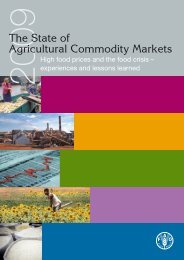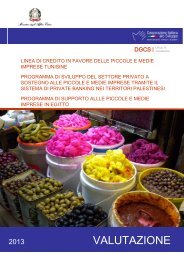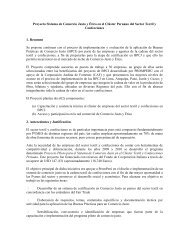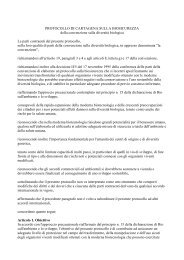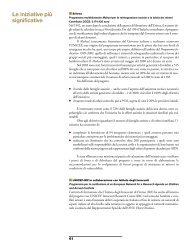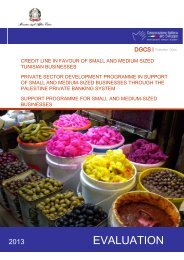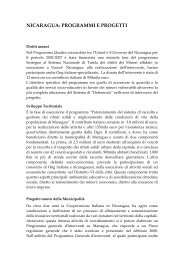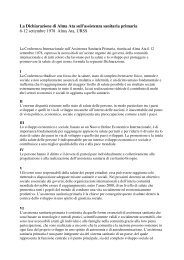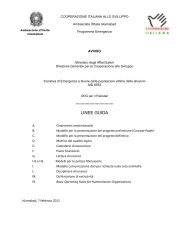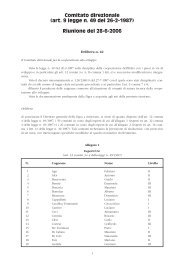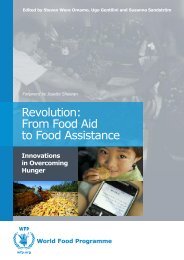Numerous are the criminal juridical cases of the so-called Merlin Law (Lawdated 20 February 1958, No. 75) which ended the system of the houses ofprostitution and abolished any listing and obligatory health treatment forprostitutes. Punished by prison from 2 to 6 years and a fine of from 258 to 10,329Euros are the various activities which go from exploitation to aiding and abettingprostitution, renting of apartments w<strong>here</strong> this is undertaken 89 . That which is ofconcern to us are the particularly revealing forecasts of numbers 6) and 7) of Art. 3of the law which punishes:“whoever leads a person to the territory of another State or however aplace different from that of their normal residence, in order to exerciseprostitution or places themselves to assist the departure”;“whoever undertakes an activity in association with national and foreignorganisations dedicated to the recruitment of persons for prostitution orexploitation of prostitution, or in whatever form and with whatever meansaids and abets the action or the scopes of such associations ororganisations”.The closing juridical case is foreseen in number 8) which sanctions whosoever,and in whatsoever manner aids and abets the prostitution of others. To this shouldbe added the juridical cases of the Penal Code which protect persons from violence(private violence, threats, lesions, blows, kidnapping of persons, sexual violence)and those who reduce to slavery or in similar conditions to slavery. To this end itshould be remembered that the reduction to slavery is characterised by “anindividual who - by means of the explicit activity of others on their person - findsthemselves (even if nominally having the status of a subject of a legal system)reduced to the exclusive property of the accused, who materially uses, gains orprofits, or disposes of, similar to the way in which - according to historicalknowledge, converged in the present socio-cultural patrimony of the members ofthe collective - the ‘owner’, at one time, exercised the ownership of the slave”(Cassazione a Sezioni Unite, 20 November 1996 - 16 January 1997, n. 261 ).Beside the reduction to slavery, Art. 601 of the Penal Code punishes “the trafficor commerce of persons in similar conditions to that of slavery”. The law of 3August 1998, No. 269 - which introduced the new juridical cases regardingexploitation of prostitution, pornography, sexual tourism to the detriment of minors- has added to such an article a second paragraph which in a specific mannersanctions those who “make exploitation or even commerce of minors undereighteen years with the objective to committing them to prostitution” foreseeing aprison sentence from 6 to 20 years 90 .89The conduct described by No. 1-5 of Art. 3 of the Law can be re-assumed as follows: 1) to have aproperty or exercise whatever form of control of a house of prostitution; 2) the rent of an apartment forthe exercise of a house of prostitution; 3) the habitual tolerance of persons who inside a place in whichone is the owner or manager are prostitutes; 4) the recruitment for prostitution or aiding prostitution; 5)induction of an adult woman to prostitution, or undertake acts of artifice.90Contextually repealed part of the aggravating circumstances foreseen in Art. 4 No. 1 of the Law No.75/1958, today re-instated in this provision.
The behaviour sanctioned is that of who “undertakes a vast action ofrecruitment, even coercive, of transport and buying-selling minors” 91 to thedetriment of more minors, of a continuative character and using a minimumorganisational structure: what remains excluded from such a provision is the single,isolated, occasional act of commerce to the detriment of only one minor.The other provision is of particular interest, introduced by the said law againstpaedophiles (l. 269/1998), represented by Art. 600 bis which sanctions, in the firstparagraph, the behaviour of those who “induce to prostitution a person of an ageinferior to that of eighteen years, or who favours or exploits prostitution” withprison sentences from 6 to 12 years, and the fine from 15,493 to 154,937 Eurosand, in the second paragraph, punishes those who commit sexual acts with a minorof between 14 to 16 years in exchange for money or other economically usefulrecompense with the alternative prison sentence (from 6 months to 3 years) or afine (not less than 5,164 Euros). The disposition is interesting for two reasons:because it enucleates the position of a minor as a fact in itself with respect tonumerous other behaviours foreseen by the historical Merlin Law concerningprostitution (l. n.75/1958) and because for the first time the regulation decides topunish the client, who uses the sexual services of a minor of between 14 and 16years.The regulation has notably simplified the behaviour punished, in respect to thatforeseen by Art. 3 and Art. 4 of the Merlin Law, sanctioning exclusively theinduction, aiding, abetting and exploiting, but has reconfirmed the desire,particularly of this legislature of 1958, to punish not only the conduct of whoobtains some benefit, an unjustified advantage from the prostitution of minors, butalso that of those who through the behaviour of aiding the induction 92 andabetting 93 , facilitates such an activity.It is t<strong>here</strong>fore evident that a remarkable amplitude of punished behaviour 94remains and the legislator has chosen to punish apart from the consensus given bythe minor with respect to the activity of prostitution. That is to say without in anyway considering the possibility of a free and informed consent, practicallyassuming the impossibility for the minor to self-determine himself/herself onhis/her sexual freedom and the harmfulness of the activity of prostitution.The only relevance that the legislature has given to the age of the minor whoprostitutes, disregarding the consensus, is within Art. 600 sexies, w<strong>here</strong> anaggravating circumstance for who induces, aids and abets, or exploits theprostitution of a minor of 14 years is foreseen: the increase in the punishment is ofone third to half of the basic punishment.91Santoro (1998, page 51).92For induction to prostitution it is intended the activity of persuasion, determination, reinforcing thedecision to prostitution already thought of by the subject or which emerges because of that activity.93For abetting it is intended whatever activity that in some way would bring about conditions favourableor more favourable for exercising prostitution.94The judicial elaboration on conducting abetting arrived for example at punishing the prostitutes thattogether rented an apartment to exercise professional activities of prostitution, considering that one wasresponsible to abetting the prostitution of the other (Cass, Sez. III, 9 July 1998, No. 2525).
- Page 1:
TRAFFICKINGOF NIGERIAN GIRLSTO ITAL
- Page 5 and 6:
F O R E W O R D1. Objectives and st
- Page 7 and 8:
and who have identified the most si
- Page 9 and 10:
on the other hand, for those involv
- Page 11:
Case files analysed: Preventive det
- Page 15 and 16:
Table 2 - Socio-economic situation
- Page 17 and 18:
Table 3 - Nigerian citizens regular
- Page 19 and 20:
Table 5 - Social protection permiss
- Page 21 and 22:
Table 7 - Number of persons charged
- Page 23 and 24:
Table 8 - Detainee population sub-d
- Page 25 and 26:
and the United States enables this
- Page 27 and 28:
C H A P T E R IW a y s a n d p h a
- Page 29 and 30:
Figure No.2 - Edo State.It is not c
- Page 31 and 32:
Nigeria. From 1996 in Benin City an
- Page 33 and 34:
In this variegated framework, the d
- Page 36:
“Benin City is one of those State
- Page 39 and 40:
Various privileged witnesses of the
- Page 41 and 42:
In the first years of the traffic o
- Page 43 and 44:
pay considerable sums for lodging,
- Page 45 and 46:
The routesWe find at least three ty
- Page 47 and 48:
Figure No.5 - Trafficking routes th
- Page 49 and 50:
The journey overland through Africa
- Page 51 and 52:
new dispositions and contacts to co
- Page 53 and 54:
Then he sends her in a taxi to the
- Page 55 and 56:
T. remains in this house for 21 day
- Page 57 and 58:
detainees go towards the refectory,
- Page 59 and 60:
At this point the organisation esco
- Page 61 and 62:
was accepted by the Ivory Coast pol
- Page 63 and 64:
B.E. «Yes, I was given a Ghanaian
- Page 65 and 66:
Now the documents are “hired”:
- Page 67 and 68:
It is understood however that the v
- Page 69 and 70:
“There is no Nigerian passport wh
- Page 72 and 73:
C H A P T E R I VL i v i n g a n d
- Page 74 and 75:
have no shop and then there is no p
- Page 76 and 77:
The cost to manage the house and th
- Page 78 and 79:
mine since a long time, he can’t
- Page 80 and 81:
A feminine managementIn analysing t
- Page 82 and 83: “There are many pimps that when y
- Page 84 and 85: The control of movementThe fact tha
- Page 86 and 87: Physical punishments can be made by
- Page 88 and 89: Control between psychological subje
- Page 90 and 91: arms), tortured in many different f
- Page 92 and 93: C H A P T E R VT h e o r g a n i s
- Page 94 and 95: Each penal procedure on the subject
- Page 96 and 97: Often it is the same madam who move
- Page 98 and 99: Even in numerous recent criminal pr
- Page 100 and 101: work arrangements (…) persons tha
- Page 102 and 103: man all the money she had in the ho
- Page 104 and 105: in the plates and everything and th
- Page 106 and 107: exploitation) has reached an amount
- Page 108 and 109: C H A P T E R V IT h e e n d o f t
- Page 110 and 111: A: «You have to bring me a present
- Page 112 and 113: Often the family is however not abl
- Page 114 and 115: the different evaluations of the as
- Page 116 and 117: The discussions on the possibility
- Page 118 and 119: eal results: to distance herself fr
- Page 120 and 121: of a different culture is very impo
- Page 122 and 123: C H A P T E R V I IC o n s i d e r
- Page 124 and 125: In the case of the girls having mor
- Page 126 and 127: As has been many times noted, the c
- Page 128 and 129: under the profile of the “quality
- Page 130 and 131: person to obtain either relevant re
- Page 134 and 135: If the accused claims to not knowin
- Page 136 and 137: sanctions, sometimes, also in prese
- Page 138 and 139: d) Investigative and judiciary co-o
- Page 140 and 141: The reform foresees, under Art. 1,
- Page 142 and 143: which the woman can definitively tu
- Page 144 and 145: witnesses, social operators - agree
- Page 146: and necessary, therefore, to think
- Page 149 and 150: in many cases they are driven to th
- Page 151 and 152: Melossi, D., (2002), “Le teorie s



